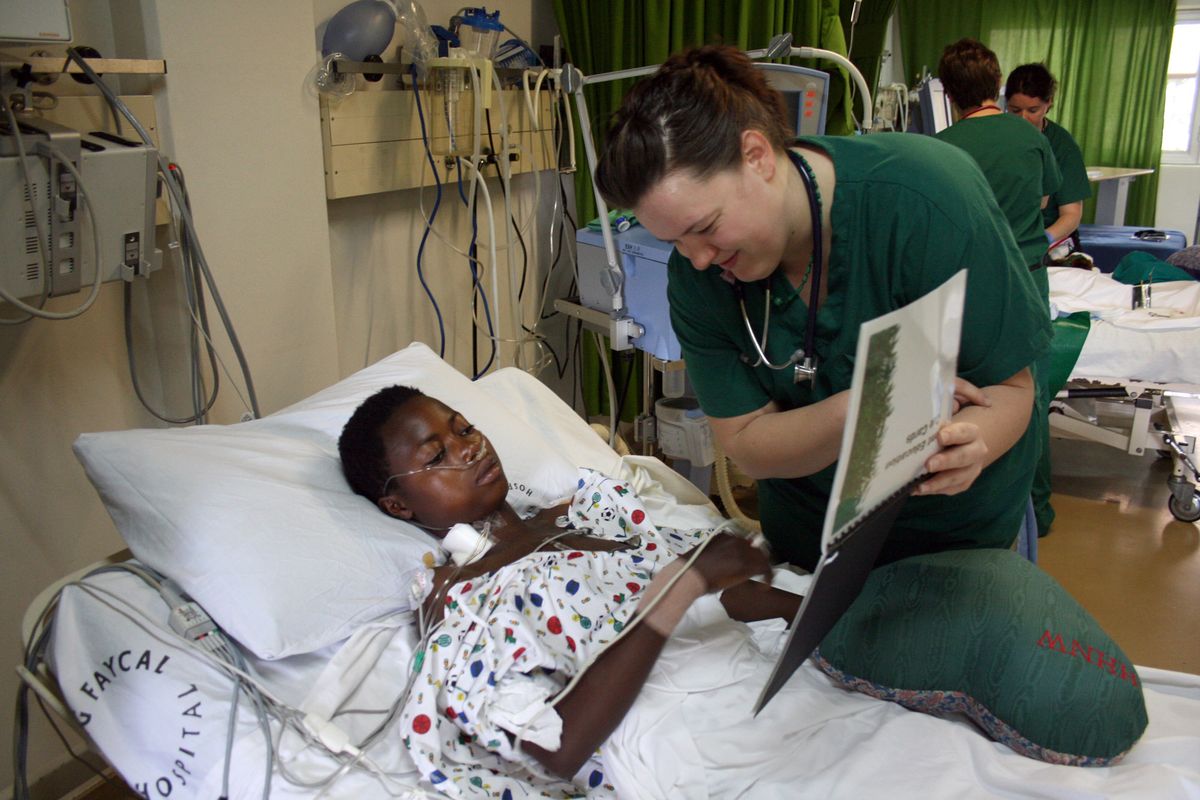16 heart patients get new lease on life
Medical teams from Spokane heal, teach in Rwanda

KIGALI, Rwanda – Felicite Mukarubuga’s hands trembled as she took the pen and consent forms. The 22-year-old Rwandan woman listened while Dr. Hal Goldberg of Spokane Cardiology thoroughly explained a procedure that would give her a mechanical heart valve, replacing the one scarred by rheumatic heart disease.
Orphaned by the 1994 Rwandan genocide that claimed the lives of her parents and about 800,000 of her countrymen, Mukarubuga quietly explained in her native Kinyrarwanda to a nurse and translator that she doesn’t know how to write.
She was one of 16 Rwandan patients treated by Goldberg and his team, Healing Hearts Northwest, last month in the central African nation. The Inland Northwest-based team worked for two weeks at King Faisal Hospital, the most modern medical facility in Kigali, Rwanda’s capital.
“We’re seeing rheumatic heart disease here in Rwanda that I haven’t seen in America for 25 years,” said physician assistant Larry Keyser of Spokane’s Heart Clinics Northwest.
Rheumatic heart disease originates with untreated strep throat. Rwanda, a country of nearly 11 million people, has only 400 physicians, including three cardiologists. Nearly 75 percent of the country’s doctors were either murdered in the brutal genocide or forced out of the country as refugees.
Keyser is one of 45 health care professionals – physicians, nurses and medical technicians – who visited Rwanda in the Healing Hearts Northwest group, a division of UJAMAA Medical Connections. During two weeks in February, the team, along with Rwandan doctors and nurses from King Faisal, successfully completed 16 open-heart surgeries that included valve replacements and repairs, repair of congenital heart defects and pacemaker placements.
“We set two principles before arrival with regard to expectations, namely: ‘Don’t promise more than you can deliver’ and ‘Deliver what you promise,’ ” Goldberg said. He spearheaded the Inland Northwest medical mission after making a fact-finding trip to Rwanda in June 2008 with UJAMAA and a trip to King Faisal Hospital in April 2009 to observe the work of a team from Boston’s Brigham and Women’s Hospital.
Goldberg worked with Dr. Joseph Mucumbitsi, the president of the Rwanda Heart Foundation and a pediatric cardiologist at King Faisal.
“The Spokane team was a success story as they not only saved 16 lives but are committed to coming back next year,” said Mucumbitsi, who said the Rwandan government helped fund the surgeries.
St. Jude Hospital donated all the valves, while Providence Sacred Heart Medial Center, Deaconess Medical Center, Kootenai Medical Center and many medical-products companies assisted with supplies and equipment. To help offset the cost of shipping 204 boxes, each Healing Hearts team member traveled with one large container. All who participated volunteered their time on the medical mission. Additionally, the team held planning meetings every week from October to December and sent a screening team to Rwanda in December to determine the best candidates for surgery.
“I knew this trip was destined to succeed because it was so well planned,” said Dr. Sam Joseph, a Spokane pulmonologist. He and Keyser donated two bicycles to patients, giving them easier access to the nearest health clinic for their new medications. “This trip is directly affecting 16 people, but the trickle-down effect is phenomenal, not only in their lives and their families, but what we’re able to do in this hospital,” Joseph added.
In addition to performing the surgeries, Healing Hearts Northwest doctors and nurses hosted training seminars, instructing the hospital staff and medical students on the symptoms and causes of rheumatic heart disease to enable earlier detection. A young Rwandan surgeon in training observed Dr. Leland Siwek and Dr. Neil Worrall in the operating room via a monitor wired to headcams worn by the two Inland Northwest doctors. Intensive care unit nurse Josephine Kamagaju said she learned much from Healing Hearts nurses on chest-tube management. Meanwhile, Felicite Mukarubuga and other patients, sporting Zags T-shirts and hats, walked around the hospital just one to two days after surgery, smiling.
“This mission had a medical imperative as well as an ethical imperative,” said Goldberg. “As a team, we came to know a soft-spoken people who remain upbeat despite the genocide of 1994. Yet with an average patient age of 24, we improved the health of the future of Rwanda.”